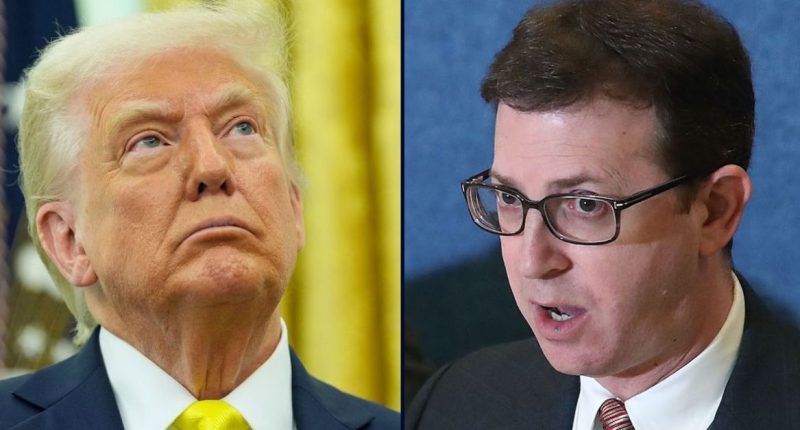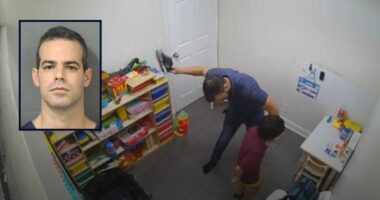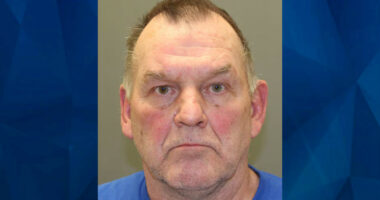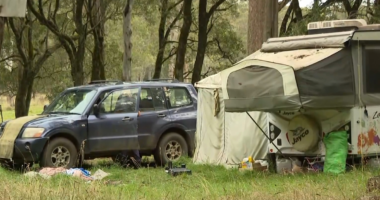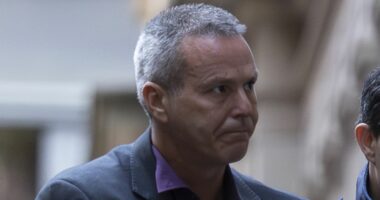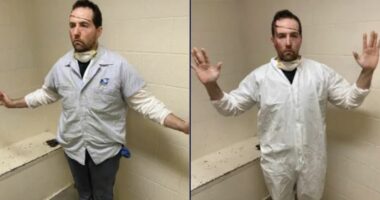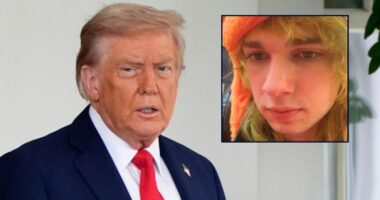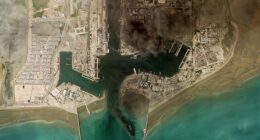Share this @internewscast.com
Left: U.S. President Donald Trump observes during the swearing-in of Dr. Mehmet Oz as the Administrator of the Centers for Medicare and Medicaid Services, in the Oval Office of the White House on Friday, April 18, 2025, in Washington (AP Photo/Alex Brandon). Right: Attorney Mark Zaid discusses an unfair competition lawsuit against President Donald Trump on March 9, 2017, in Washington, D.C. (Photo by Mark Wilson/Getty Images).
National security lawyer Mark Zaid is no stranger to suing the government – but usually on behalf of his own clients.
Now that he is a plaintiff, Zaid’s legal team is urging a federal judge to view him similarly to various large law firms that have been the focus of President Donald Trump’s consecutively blocked executive orders.
In late March, the 45th and 47th president stripped Zaid and 14 other high-profile individuals of security clearances in an executive order.
Unlike the dramatic language used in measures aimed at these disfavored law firms, the executive order plainly stated that the president “determined that it is no longer in the national interest” for the 15 individuals mentioned, many of whom are seen as Trump’s critics or adversaries, to “access classified information.”
Love true crime? Sign up for our newsletter, The Law&Crime Docket, to get the latest real-life crime stories delivered right to your inbox.
But Zaid’s law practice relies on such access.
During a Friday hearing on motions for a preliminary injunction – filed by the plaintiff – and to dismiss – filed by the government – Zaid’s attorneys argued that his legal work was highly-specialized and necessitated a quick return to the status quo.
“For 30 years, he has carved out a very specialized niche,” attorney Abbe Lowell said, according to a courtroom report by Bloomberg Law.
Lowell went on tell U.S. District Judge Amir H. Ali, a Joe Biden appointee, that Zaid was therefore uniquely situated and in the “best position” of all those attacked by Trump’s executive order to litigate the case.
Lowell – who went solo this year in response to Trump’s attacks on law firms – went on to describe his client as “one of the premier attorneys in the United States” who practices national security law, according to a courtroom report by the National Law Journal.
In the case, the 29-page complaint assails Trump’s order as “improper political retribution” and “dangerous, unconstitutional retaliation.”
During the hearing, Ali juxtaposed the May 5 filing date of the lawsuit with the timing of the executive order – issued on April 23.
“Does that suggest a lesser degree of urgency?” the judge asked.
Attorney Margaret M. Donovan reportedly pushed back.
“We are sort of in a time-sensitive posture, and that’s why we moved for a preliminary injunction,” she said.
Substantively, a great deal of the battle before the court is the basic question of judicial review.
To hear the government tell it, Zaid’s lawsuit is precluded by the political question doctrine.
“This Court should reject Plaintiff’s request to arrogate the Executive power to itself and second guess the President of the United States,” White House attorneys argued in a memorandum attached to a motion to dismiss on May 30. “To begin, whether Mr. Zaid should or should not be granted security clearance is a quintessential political question not cognizable in federal court.”
Zaid’s team rejects that argument out of hand.
“Defendants continue to insist that summary, arbitrary, process-less revocations of security clearances are non-justiciable,” a June 13 reply memo filed by the plaintiff reads. “Constitutional violations related to the denial of security clearance adjudicative processes are reviewable.”
The government, to make its case, is relying on a 1988 U.S. Supreme Court case and a 2024 Court of Appeals for the D.C. Circuit case to argue the president has exclusive “authority to classify and control access to information bearing on national security” including assessments of “loyalty to the United States, strength of character, trustworthiness, honesty, reliability, discretion, and sound judgment.”
Zaid, however, says those citations are being expanded and misapplied by the Trump administration; his legal team argued the situation is more analogous to the situations where three Big Law firms – Perkins Coie; Jenner & Block; and Wilmer Cutler Pickering Hale and Dorr – were able to successfully beat back against the executive branch and obtain injunctive relief.
Those rulings, Zaid’s team pointed out, happened this year. And a fourth similarly situated law firm targeted by Trump – Susman Godfrey – just won their own relief on Friday.
Zaid offered an upbeat post-mortem of the hearing.
“I was very pleased with the substantive arguments presented by my legal team, and I viewed the Trump administration as undermining its case by continuing to adhere to absolutes,” he told Law&Crime in an email. “We simply do not have a king in our country. The president’s exercise of his power is not the end of the story. And the latest victory for Susman Godfrey is just further evidence in my favor.”
Over several decades, Zaid has represented a wide variety of clients, including, most famously, whistleblowers. The seasoned national security attorney represented the key whistleblower in the Ukraine scandal that led to Trump’s first impeachment in December 2019.
And, until recently, his access has never been a problem.
“Since 2017, Mr. Zaid has handled cases involving Mr. Trump and his Administration much in the same manner as he had with other Presidential administrations,” the lawsuit goes on. “But it was not until the 2019 [intelligence community] Whistleblower matter that Mr. Zaid apparently came onto President Trump’s radar, immediately sparking his ire and that of his loyalists both inside and outside the government.”
Trump’s disdain for Zaid is a matter of public record.
“In the aftermath of Mr. Zaid’s role as legal counsel becoming public, President Trump called him a ‘sleazeball,'” the lawsuit explains. “The President’s comments occurred at a televised political rally in Louisiana in November 2019, along with his displaying a photo of someone said to be Mr. Zaid … Days after the Louisiana rally, President Trump spoke to reporters at the White House about the impeachment witness: ‘The whistleblower, because of that, should be revealed. And his lawyer, who said the worst things possibly two years ago, he should be sued and maybe for treason. Maybe for treason, but he should be sued. His lawyer is a disgrace.'”
